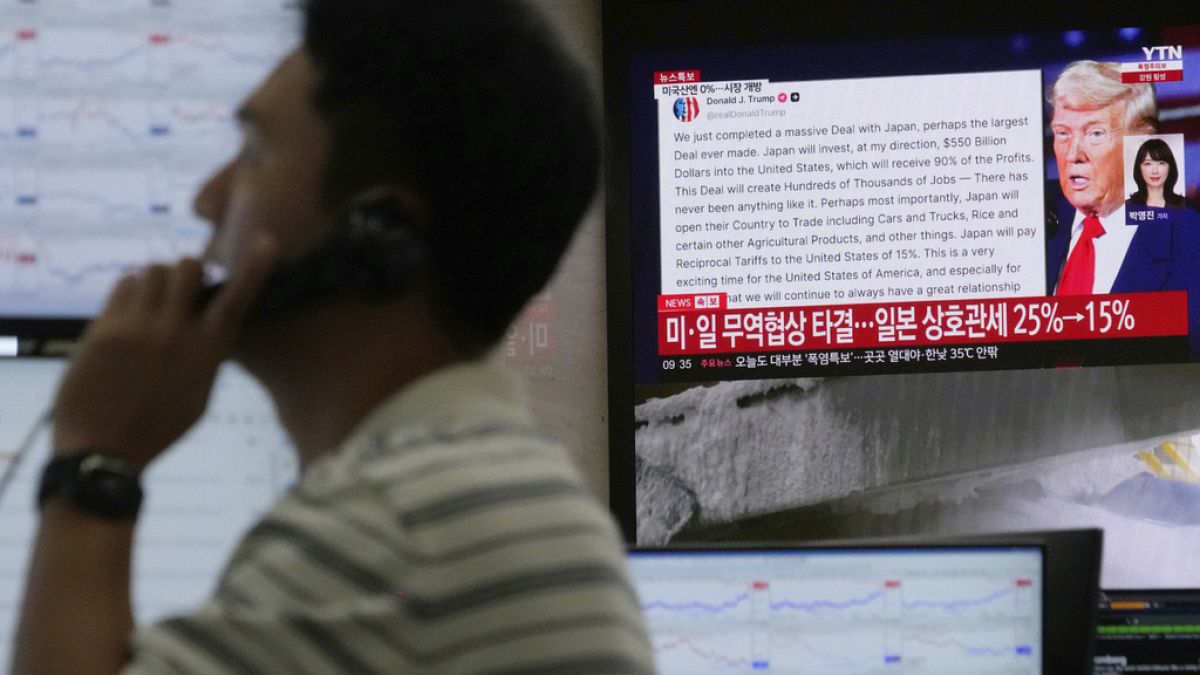The world’s biggest economy, the US, and the fourth-largest, Japan, have agreed on a trade deal causing Asian shares to surge, with carmakers leading the way on the prospects of lower tariffs.
The US and Japan agreed to put a 15% import duty on goods imported from Japan, apart from certain products such as steel and aluminium that are subject to much higher tariffs. That’s down from the 25% that Trump had said would take effect on 1 August if a deal was not reached.
This boosted investors’ sentiment, resulting in Tokyo’s Nikkei stock index rising by nearly 3.9% in the morning in Europe, the Asia Dow increasing by 2.7%, and Hong Kong’s Hang Seng jumping 1.3%, while the Shanghai Composite index gained 0.4%.
The real trade booster came from the car sector, media reports suggested that Japanese car exports to the US could be subject to a lower tariff than their global competitors.
However, key details of the deal remain unclear; Japanese broadcaster NHK reported that the overall tariff rate on autos would be 15%. This could replace the current 25% tariff combined with the 2.5% duty, which is currently imposed on all imported cars in the US.
The news fuelled investors’ hopes for the future of the biggest Japanese carmakers, pushing Toyota’s shares up by more than 14.3%, Honda’s shares soared by 11.1%, and Nissan gained nearly 8.3% by the close of Asian trading.
There was a chorus of no comments from the Japanese automakers, despite the latest announcement, including Toyota Motor Corp, Honda Motor Co and Nissan Motor Corp.
Japanese companies tend to be cautious about their public reactions, and some business officials have privately remarked in off-record comments that they hesitate to say anything because Trump keeps changing his mind.
Trump: The US is looking at ‘hundreds of thousands of jobs’
“This Deal will create Hundreds of Thousands of Jobs — There has never been anything like it,” Trump posted on Truth Social, noting that Japan was also investing “at my direction” $550 billion (€468.7bn) into the US. He said Japan would “open” its economy to American autos and rice.
Japan’s Prime Minister Shigeru Ishiba welcomed the agreement as beneficial to both sides.
So far, the US economy appears to be powering through the ‘tariff uncertainty’ as many of Trump’s proposed taxes on imports are currently on hold, and the next major deadline is 1 August. Talks are underway on possible trade deals with other countries that could lower the stringent proposals before they take effect.
“President Trump has signed two trade deals this week with the Philippines and Japan which is likely to keep market sentiment propped up despite deals with the likes of the EU and South Korea remaining elusive, for now at least,” Tim Waterer, chief market analyst at Kohle Capital Markets, said in a report.
What happened in the US markets overnight?
On Tuesday, the US stock market inched closer to another record following some mixed profit reports, as General Motors and other big US companies provided updates on how much Trump’s tariffs are hurting or helping them.
The S&P 500 added 0.1% to the all-time high it had set the day before. The Dow Jones Industrial Average rose 0.4%, but the Nasdaq composite slipped 0.4% from its own record.
In the bond market, US Treasury yields sank as traders continue to expect the Federal Reserve to wait until September at the earliest to resume cutting interest rates.
The yield on the 10-year Treasury eased to 4.34% from 4.38% late Monday.
In other dealings early Wednesday, US benchmark crude oil WTI was down nearly 1.5% at $65.22 a barrel. Brent crude, the international standard, was also slightly down by 0.07% at $68.54 a barrel in the morning in Europe.
In currency trading, the US dollar inched up to 146.92 Japanese yen from 146.64 yen. The euro cost $1.1737, down from $1.1754.

